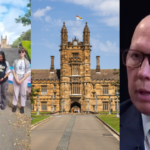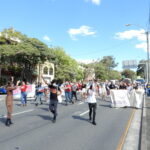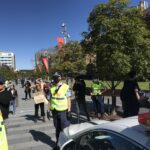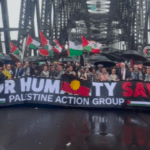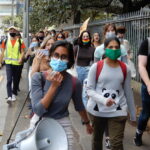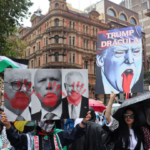Sydney Uni Protesters Vindicated, as No Evidence of Antisemitic Incidents on Campus Exists
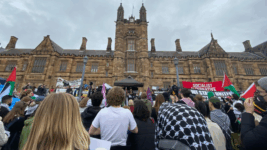
As local university students took their cue from US counterparts and commenced on campus Gaza solidarity encampments in April 2024, a moral panic arose around a suggested proliferation of complaints about antisemitic incidents at tertiary institutions. But the NSW institution understood to be the chief offender, Sydney University, has revealed it has no record of any such incidents.
This revelation came last Friday, 31 October 2025, as the NSW upper house Antisemitism in NSW inquiry received responses to questions put to the institution in relation to the deluge of complaints, only to find that USYD does not make findings on antisemitism but rather records incidents “connected to the Middle East conflict”. Therefore, it has no records of any antisemitic complaints.
These responses by USYD senior deputy vice chancellor Professor Annamarie Jagose are shocking, considering reports in the mainstream media relating to universities having become significant sites of antisemitism were widespread last year. And despite this, USYD vice chancellor Mark Scott was apologetic for his institution’s failings in dealing with antisemitism at a federal government inquiry.
The wider implications of the lack of any evidence of antisemitic incidents occurring at the University of Sydney is that the idea that tertiary institutions had become “hotbeds of antisemitism” formed one of two planks of the broader NSW antisemitism crisis of 2024, with the other plank being a spate of so-called antisemitic crimes that NSW police revealed were staged to convey such a crisis.
The questions that garnered these responses were put together by NSW Labor MLC Stephen Lawrence, to serve as follow up inquiries after the USYD deputy vice chancellor testified at the upper house inquiry on 16 June. Indeed, the revelations lay bare the inquiry’s terms and references, which included “record levels of antisemitism on university campuses”, to be somewhat misguided.
No recorded antisemitic incidents
The question Lawrence put to the USYD deputy vice chancellor in respect of the institution that first staged a Gaza solidarity camp and was most implicated in the antisemitism crisis, sought summaries and descriptions of each “proved instance of antisemitism found to have occurred at the University since 7 October 2023”. It too asked for the substance of each incident that revealed it as antisemitic.
“Under its policies, the University of Sydney does not make specific findings of ‘antisemitism’,” states the letter undersigned by Jagose. “Therefore, there are no records that directly address this question. Below are cases connected to the Middle East conflict that were assessed as misconduct.”
The letter then outlines that the Middle East conflict incidents that comprised the crisis at USYD involved nine cases of assessed misconduct attributed to staff and six to students. These incidents include raising flags up poles, making political comments and inappropriate behaviour. One incident mentions anti-Palestinian behaviour, while only one lists any antisemitism being involved.
Antisemitism is prejudice towards Jewish people due to their religion. During the 24 months of the Gaza genocide, the local Israel lobby has been at pains to conflate criticism of Israel’s mass atrocities against the Palestinians of Gaza as antisemitic, in order to deflect such criticism in public. The USYD incidents overwhelmingly reflect criticism of Israel, not hatred towards Jews.
The May 2024 documentary Never Again: The Fight Against Antisemitism, hosted by former treasurer Josh Frydenberg, was emblematic of the manufactured antisemitism moral panic that swept the nation of Australia last year. It appeared just a month into the suggested antisemitism crisis on Australian university campuses and five months prior to the fabricated antisemitic crimewave.
The academic lobby
Inquiry members also put questions to Australian Academic Alliance Against Antisemitism director Professor Gregory Rose, following his 19 May appearance before the antisemitism inquiry. The responses by Associate Professor David Knoll on behalf of Rose are further revelatory. Established in October 2023, the alliance is representative of 31 universities and medical centres.
The NSW Labor MLC ascertained from this new lobby group, which also goes by the title 5A, that it’s funded by its membership and it has no financial support coming from Israel. Half of its representatives do, however, come from USYD: the manufactured hotbed of antisemitism. Knoll further indicated that 5A has supported staff and students in making complaints.
The fourth question put to the academic anti-antisemitism advocacy body was how many of the suggested antisemitism complaints lodged between November 2023 and April 2025 at Australian tertiary institutions did 5A directly or indirectly contribute to, “either by helping draft, craft, and submit, either through formal university disciplinary processes, or via informal complaints”?
“It is difficult to respond to this question, because there was no systematic keeping of records,” outlines 5A member Knoll. “Each university has its own 5A coordinator. These coordinators often address local issues without involving the national directors. Additionally, it is common for 5A members to send individual complaints not registered anywhere.”
Knoll then quotes the USYD 5A coordinator as having stated that they were in contact with 70 to 80 “Jewish and Israeli staff and dozens of Jewish and Israeli students”, along with approximately 30 to 50 non-Jewish staff, who have lodged hundreds of antisemitic complaints, which, if this is the case, fail to show up on any list, with the official list rather covering 15 Middle East conflict issues.
The USYD 5A coordinator further outlines that they have assisted many students and staff over their time in operation. They described on campus life over 2024 to be a “daily crisis situation” in respect of antisemitism, and in particular, “during events such as protests, rallies, speaking events and, of course, the ‘encampment’. They add that all of these were “anti-Israel and the majority antisemitic”.
In light of the implications of the deputy vice chancellor’s responses, these comments on the part of the USYD 5A coordinator ring completely false. As per the evidence tabled to the NSW Legislative Council inquiry, none of these protests, including its encampment, which was suggested to involve the broadest antisemitic transgressions, were shown to be harbouring hatred towards Jews.
A manufactured crisis
The antisemitism panic at tertiary institutions led to the Parliamentary Joint Committee on Human Rights inquiry into Antisemitism at Australian universities. USYD vice chancellor Mark Scott told the inquiry during a November 2024 public hearing that “a significant number of changes to our policies, procedures and practices” had been made due to the crisis that there is a lack of evidence for.
“Those changes have a particular focus on addressing antisemitism and the experiences of our Jewish students and staff and, in addressing cultural bias of every kind, we believe they benefit the whole university community,” said Scott, eleven months prior to the inquiry responses revealing that there was no actual need to deal with a crisis in antisemitism.
These changes included the establishment of a Campus Access Policy, which involved a crackdown on and stamping out of unapproved protests on campus. Further the complaints system was overhauled and university policies were reviewed.
Not only did USYD undertake major reforms due to an antisemitism crisis that never really was, but Universities Australia released a 27 February statement announcing its 39 members were adopting a new definition on antisemitism that in part includes certain criticisms of Israel, and this type of definition tends to ultimately result in all criticism of Israel being demonised as antisemitic.
Combined with the fact that in March this year, the AFP and NSW police held a joint presser that revealed that the major so-called antisemitism arson and graffiti attacks that occurred on Gadigal and Dharug land in Greater Sydney over October 2024 to February 2025 were all false flag operations.
Federal and state law enforcement explained that a local organised crime figure who was based overseas at the time had paid gig criminals in Australia to commit these crimes to convey a crisis in antisemitism, so that the individual could provide police with tip-offs about these criminal offences in order to gain discounts on the penalties they received in respect of an unrelated criminal matter.
So, with these two major planks of the so-called 2024 Australian antisemitism crisis and moral panic having been dispelled, those who doubted that the local constiuency had been a party to a legitimate crisis in antisemitism, have been vindicated in that opinion.
However, as mainstream media manufactured crises are not easily dismissed, and as significant official reforms in response to the antisemitism moral panic have been progressed, which include new NSW hate crimes and antiprotest measures, the further understanding is that those forces behind the feigned crisis have been successful in securing changes that reflect it was legit.
In response to this article the University of Sydney has provided the following statement from a spokesperson:
“We’re concerned there has been a fundamental misunderstanding of our position regarding reports of antisemitic incidents on campus, and a conflation of misconduct matters with complaints.
Last year we received a large number of complaints where the complainants considered there had been antisemitic conduct.
As we explained to the inquiry, under our policies we don’t make specific findings of ‘antisemitism’, rather we consider whether there has been a breach of our policies or codes of conduct – so the claim there are ‘no records of any antisemitic complaints’ is incorrect and that there are ‘no recorded antisemitic incidents’ is highly misleading.
The 15 misconduct matters referred to are the number of complaints where we had sufficient information to undertake a misconduct process, the person who engaged in the conduct was identified as a member of our University community, and the conduct was considered to be contrary to our policies or codes of conduct. We’ve taken a number of other actions in response to complaints about unacceptable conduct including banning people from our campuses, removing posters and graffiti and issuing cease and desist letters to relevant organisations.
The assertion there is an inconsistency between the submissions of the Australian Academic Alliance Against Antisemitism and the University misunderstands the difference between complaint records and misconduct processes, and the ways we address complaints outside formal misconduct processes.”


